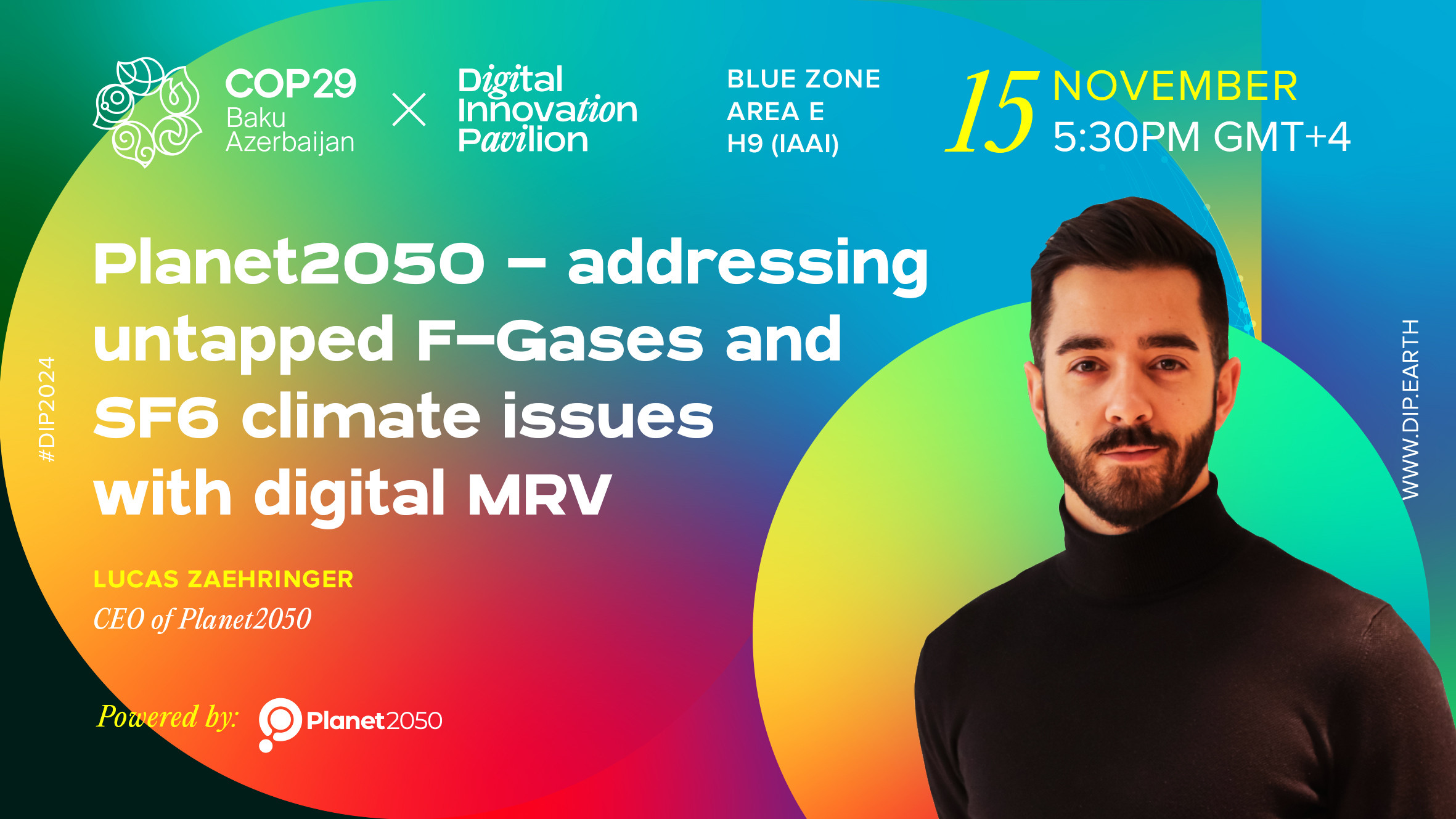Planet2050 in Carbon Pulse: Reales Potenzial zur Reduzierung von SF6-Emissionen vorhanden
Lesezeit: 4min

Die Kohlenstoff-Nachrichtenplattform Carbon Pulse hat gestern einen Artikel veröffentlicht, der sich mit den COP29-Panels und Diskussionen befasst. Zudem beleuchtet der Artikel Expertenmeinungen zum Potenzial von Klimafinanzierung und Kohlenstoffgutschriften, um die Emissionen von SF6 in Stromnetzen zu reduzieren.
Probleme im Zusammenhang mit SF6 in Stromnetzen
Schwefelhexafluorid (SF6) ist ein extrem dichtes Gas, das häufig als Isoliermedium in Stromnetzen eingesetzt wird, insbesondere in Hochspannungs-Schaltanlagen (Gas Insulated Switchgears – GIS).
SF6 bietet hervorragende technische Eigenschaften, kann aber gleichzeitig äußerst schädlich für die Umwelt sein. Sein Global Warming Potential (GWP) beträgt 25.200-mal so viel wie das von CO₂ und es verbleibt bis zu 3.200 Jahre in der Atmosphäre – im Gegensatz zu CO₂, das Teil des natürlichen Kohlenstoffkreislaufs unseres Planeten ist.
Deshalb ist es entscheidend, Maßnahmen zu ergreifen und die unkontrollierten Emissionen von SF6 zu begrenzen.
Woher stammen SF6-Emissionen?
Insbesondere bei alternder elektrischer Infrastruktur wie Schaltanlagen kann es zu Gasleckagen kommen, die oft schwer zu erkennen und zu beheben sind.
Zudem können unsachgemäße Handhabung während Wartungs- und Reparaturarbeiten sowie eine ineffiziente Rückgewinnung bei der Stilllegung von Anlagen zu SF6-Emissionen führen.
Wie wir gegenüber Carbon Pulse erläutert haben, befinden sich 80 % des weltweiten SF6-Bestands in gasisolierten Hochspannungsschaltanlagen, die eine kritische Rolle für die Hochspannungstransmission in unseren Stromnetzen und großen Industrieanlagen spielen.
Der geschätzte weltweite SF6-Bestand liegt zwischen 100.000 und 200.000 Tonnen, was einem potenziellen CO₂-Äquivalent von 2,3 bis 4,6 Milliarden Tonnen entspricht.
Diese Zahlen stammen aus dem Jahr 2020, doch man muss berücksichtigen, dass die Stromerzeugung bis 2050 voraussichtlich vervierfacht wird.
Nicht der gesamte SF6-Bestand wird entweichen, aber diese Zahlen verdeutlichen die Größenordnung des Problems – und das reale Potenzial für Emissionsvermeidungsgutschriften.
Die folgende Grafik gibt einen Überblick über die Emissionsprognosen und die atmosphärische Konzentration von SF6.

SF6 in COP29

Während der COP29 fanden zwei SF6-bezogene Veranstaltungen statt:
Die erste wurde von Planet2050 im Digital Innovation Pavilion organisiert, wo Lucas Zaehringer die Herausforderungen im Zusammenhang mit SF6-Emissionen erläuterte und unsere laufende Initiative zur Nutzung von digitaler Rückverfolgbarkeit und IoT vorstellte.
Die andere Veranstaltung fand am Tag 6 im IETA Pavilion statt und wurde vom Bundesministerium für Wirtschaft und Klimaschutz (BMWK) sowie der Perspectives Climate Group ausgerichtet.

Die deutsche Regierung ist daran interessiert, eine globale Strategie und politische Maßnahmen für SF6 zu entwickeln – das stärkste Treibhausgas, das bislang nur wenig Aufmerksamkeit im internationalen Klimaschutz erhalten hat.
Das Projekt wird unter anderem mit Unterstützung der deutschen Entwicklungsagentur GIZ und der Perspectives Climate Group durchgeführt und erhält Finanzierung von der Internationalen Klimaschutzinitiative (IKI).
Axel Michaelowa, Senior Founding Partner bei Perspectives Climate, betonte, dass die internationale öffentliche Klimafinanzierung technische Unterstützung und Kapazitätsaufbau bieten kann – sowohl für die Installation und Wartung neuer, SF6-freier Schaltanlagen als auch für die Schaffung geeigneter regulatorischer Rahmenbedingungen.
Er betonte zudem die mögliche Rolle von Kohlenstoffgutschriftenprogrammen als eine Möglichkeit, den Privatsektor zu mobilisieren. Die Nachfrage nach SF6-bezogenen Kohlenstoffgutschriften würde von Regierungen kommen, die ihre Nationally Determined Contributions (NDCs) innerhalb des Pariser Abkommens erreichen müssen und dabei ihre SF6-Emissionen abdecken, oder von Fluggesellschaften, die verpflichtet sind, Emissionen innerhalb des CORSIA-Programms auszugleichen.
Die Rolle von Planet2050 bei der Reduzierung von SF6-Emissionen
Planet2050 und MasterGrid haben im August 2024 auf dem führenden CIGRE-Kongress in Paris eine strategische Partnerschaft bekannt gegeben. Das Event brachte technische Experten aus dem Bereich Netztechnologien zusammen.
Planet2050 bringt seine Expertise in den Kohlenstoffmärkten und digitalen Tracking-Technologien ein, während es gleichzeitig von der über 100-jährigen Erfahrung von MasterGrid profitiert. MasterGrid ist weltweit in der Netzwerkinfrastruktur tätig und spezialisiert auf die Herstellung und Wartung von hochspannungsisolierten Schaltanlagen (GIS).
Lösungen zur SF6-Reduktion existieren bereits, insbesondere in den Bereichen Schulungen zur Reduzierung von Fehlbedienungen, Leckageerkennung und -reduzierung, Abdichtung und Reparaturmaßnahmen. Die ersten Projekte könnten bereits 2025 registriert werden.
Planet2050 bereitet derzeit erste Pilotprojekte für 2025 vor und lädt Netzbetreiber, Wartungsspezialisten und Dienstleister ein, sich an der Initiative zu beteiligen.
_______
Sie können mehr im Artikel von Carbon Pulse lesen: https://carbon-pulse.com/350606 und sich hier für den Planet2050-Newsletter anmelden.